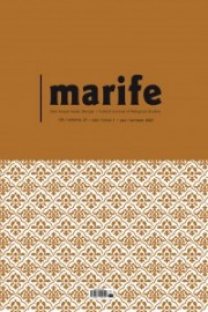Mu’tezilî Müfessir Zemahşerî’nin Muhkem ve Müteşâbih’e İlişkin Görüşlerinin Analitik İncelemesi
___
- ..............................................................................................................................................................................................................................
- Yayın Aralığı: 2
- Başlangıç: 31.05.2001
- Yayıncı: Yediveren Kitap
"Mutezile ve Hadis", Hüseyin Hansu
Mu’tezile Ekolü Teşekkülü, İlkeleri ve İslâm Düşüncesine Katkıları
Hint Düşüncesi -Özellikle Budist Düşünce-nin Kelâm Doktrinlerindeki Bazı Hususlara Etkisi Üzerine
Mu’tezilî Müfessir Zemahşerî’nin Muhkem ve Müteşâbih’e İlişkin Görüşlerinin Analitik İncelemesi
Mu’tezile’nin İslam Bilim Geleneği Açısından Değerlendirilmesi
